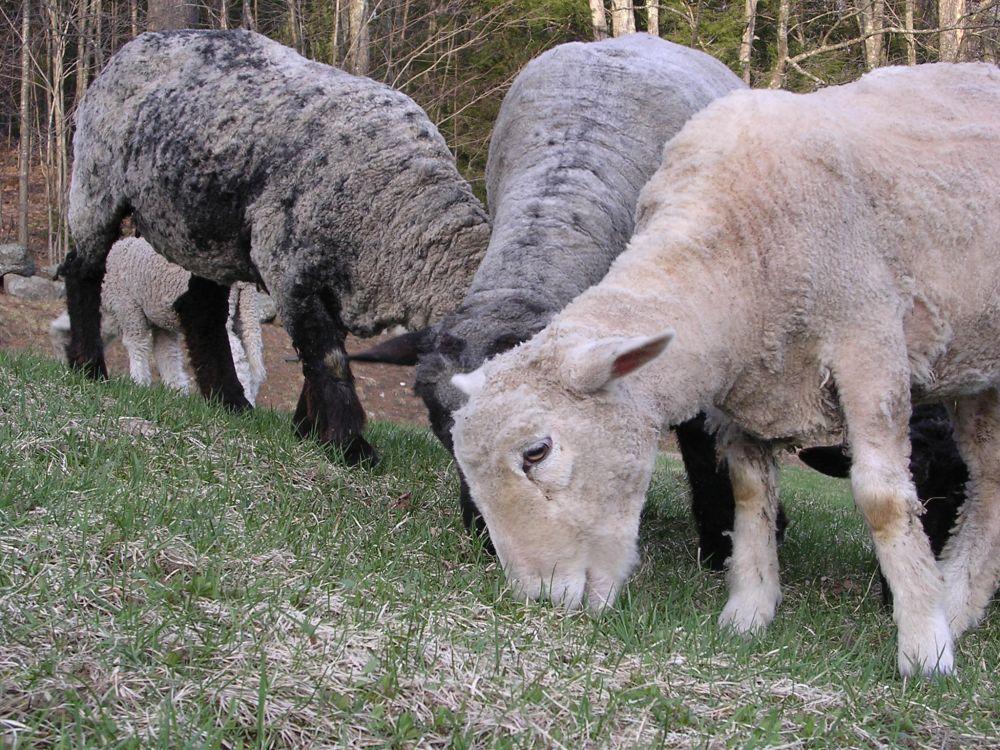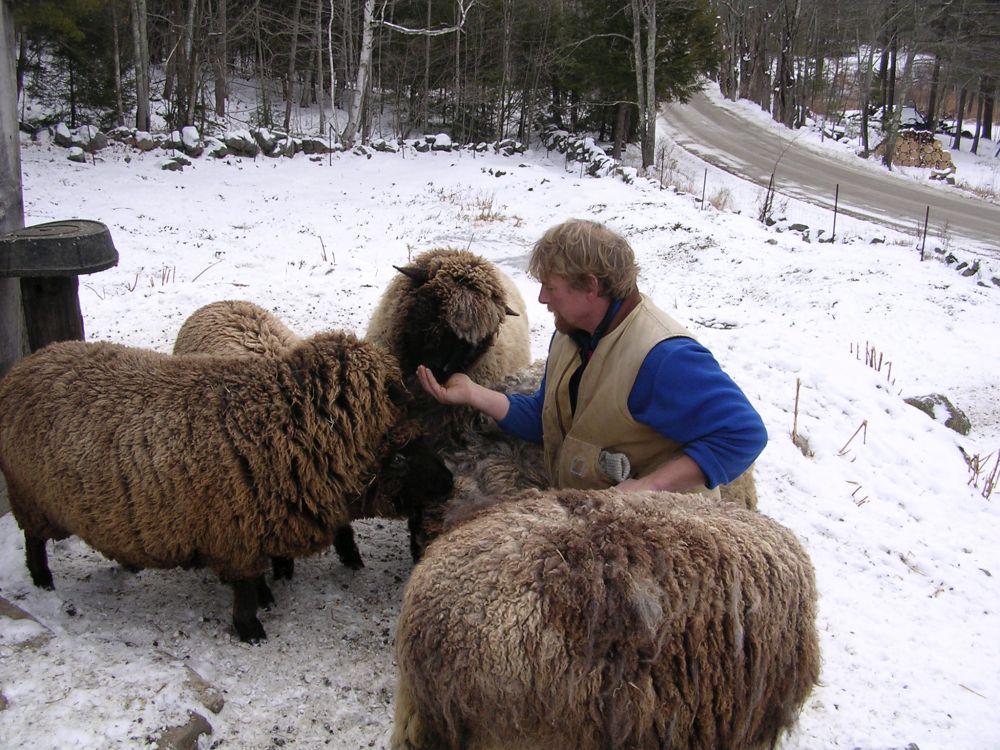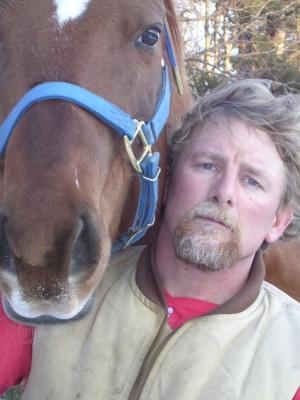- Tags:
- Forest Society History

Once a more common sight, sheep farming transformed farming and the forests of rural NH, peaking between 1835 to 1840. Photo Chris Wells.
Rural survival once depended on an ability to read the land; to see and sense patterns and to respond to changing seasons and weather. Robert Frost described his emotional response to a tree tossing in the wind outside his bedroom window as "inner weather." New England has a rich tradition of poets, writers and naturalists who celebrate the interplay of nature and culture. Our landscape and our communities create and define New England yankee character.

Attending to chores on a small, backyard farm is a wellspring of daily inspiration for me – figuratively and literally. Working out-of-doors helps to briefly connect me every day to the weather, seasons and animals both domestic and wild. Morning chores offer the rare opportunity to slow down and to see the pattern of seasons and years. The morning routine – hauling water, grain and hay to a flock of sheep and a horse allows me witness the subtle, ever-changing angle of the sun, to glimpse a coyote bounding over a stonewall or listen to owls or spring peepers calling. Splitting cordwood, shoveling manure, tilling, planting and mowing are ritual labors – seasonal worship rich in repetition like counting prayer beads or chanting a mantra.
Farm lore is rich in observance of the little ceremonies of seasonal labor. Mundane chores become a ritual ghost dance that evokes echoes of the past. The farm is a tie that binds me to the land and to my predecessors. Their ghosts are my companions. I catch a fleeting glimpse from the corner of my eye or hear a phrase in the wind. I follow fading footprints in the grass of the pasture along the faint path that leads to the well. The deep stone-lined well, capped with newer cement tiles and topped with a red hand pump, is the original source of water to our farm and my local version of the oracle at Delphi.
In the first hard freeze of late autumn, the cold, steel pump arm stuck to my hands. Ice locks its throat so I fetched wrenches to loosen its bolts, dismember it, embalm the leather gaskets in oil, and bury the cast iron carcass in a box inside the barn. The pasture lay frozen and brown. The season of green grass was done and the livestock were confined to their pens. In December, winter seems a long, dark culvert with no light in sight at the end.
In bitter January, the farm was entombed in ice and snow. Pregnant ewes grew plump, unborn lambs swelling like seeds of spring. Each morning, I chipped the ice from rubber water buckets and spread sweet-scented hay for the sheep. I shoveled and hauled frozen manure to an unseen vegetable garden beneath the snow behind the barn. The cold wind stung my ears and cracked my lips. The old adage "as the days grow longer, the cold grows stronger" is very true.
In March, the garden emerged from beneath the snow. The cordwood pile had nearly all gone up the chimney in smoke. In April the lambs were born. Coyotes emboldened with late-winter hunger, chased frail deer down from the woods and prowled our fences at night. I fretted about the farm each morning, then went to work – like most people – in a dry, climate-controlled office.
Spring days bring new arrivals – redwings, robins, phoebes, song sparrows and tree swallows have returned in the past month. On the first warm day in May, I reinstall the well pump like a clergyman performing a ceremonial sacrament. I lift the creaking pump arm and prime its gulping throat. Bright, crystal water rises from the cold, dark depths of the well, filling, spilling and splashing-forth like a liquid song of bluebirds singing in the apple blossoms. The creaking sound of a hand pump evokes spirits of a rural New Hampshire, a timeless sense that the circle of seasons has again closed.
Kelly green grass glistens in wet seeps of the pasture and the dandelions splash yellow on the fields. Newly-shorn ewes graze hungrily while the little lambs gambol and play, leaping and kicking or bouncing stiff-legged around the pasture. Plaintive bleating from a wobbly, frightened lamb summons a low-pitched reassurance from its mother. The sounds of a warm May day – so hard to imagine in mid-winter – recall a lifestyle all but forgotten in a century following local farm abandonment.
A legacy of lost farms is summoned-forth in spring by that well pump. In the surrounding woods lie forgotten cellars flanked by tumbled rock walls and twisted, dead apple trees and hidden pasture springs. A floodtide of trees inundated these hills and valleys once all cleared to pasture. Decades accumulated like a blanket of fallen leaves, obscuring the past. But the land remembers…
From the crumbling cellars of abandoned farms and from the depths of stone-lined wells, from relict orchards and family burial plots, the spirit of old New Hampshire rises and soars like a broad-winged hawk migrating north on a warm May afternoon. The old ghosts of this place gather and smile. The cadence of horse hooves echoing off marble and slate headstones in a graveyard awakens the spirits. Repeating their remembered names confers a kind of blessing – it makes the hair on the back of my neck stand on end.

Repetition of farm chores traces a circle of seasons. To know a place well is a conscious experience of following fading footprints of those who came before with plows and pitchforks and hay rakes; with oxen, horses, chickens and sheep. What we learn from our predecessors, we leave for some successor to follow. We dance a ghost dance to both remember and honor the past.
What we raise on our farm is ghosts. A haunting sense of déjà-vu becomes a spine-tingling moment of clarity when bleating lambs dance in spring pastures and the creaking well pump spills its bright water – a ghost dance which summons voices of the land. With superstitious attention to ceremony, the land whispers its secrets – stories of lives lived right here and the names of honored ancestors now all but forgotten.
When too few people care or pay attention, the rural ghost dance ceremony will be forgotten. This place may become like all the other places where local history is forgotten.
